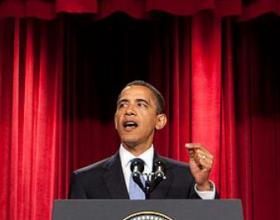Castro, Cuba, Obama - and Iran
By Elliott Abrams
WeeklyStandard.com
Imagine for a moment that you are a Saudi, Emirati, Jordanian, or Israeli. Your main national security worry these days is Iran—Iran’s rise, its nuclear program, its troops fighting in Iraq and Syria, its growing influence from Yemen through Iraq and Syria to Lebanon.

Obama in Cairo
Your main ally against Iran for the past decades has been the United States. Naturally you worry about American policy. You remember President Obama’s outreach to Iran in 2009, and his failure to back the Iranian people’s protests in June of that year after the stolen election. You wonder if the United States can be relied on, or will one day announce a major policy shift.
What shift? A rapprochement with Iran that ends the sanctions, throws an economic lifeline to the regime, re-establishes diplomatic relations with it—in exchange for nothing. That is, the Islamic Republic would make no concessions about its foreign or domestic policies. And the change in U.S. policy would show that in the long struggle between the United States and Iran since 1979, the Americans have finally blinked.
And now, you turn on the TV and see the announcement about the change in American policy in Cuba. Re-establishment of diplomatic relations. Lots of changes in the embargo that will mean plenty more cash for the Castros. A change in the whole American official position vis-à-vis Cuba. In exchange, the Castro brothers have pledged to let 53 political prisoners out, free one American spy, and free the American hostage Alan Gross. As to real changes in the regime—changes in its foreign or domestic policies—none. Zero. Zip. So, you conclude that in the long struggle between the United States and the Castro regime since 1959, the Americans have finally blinked.
Your conclusion about Iran is inevitable: that the Obama administration cannot be relied upon and is quite likely to abandon America’s Iran policy as well. Your only hope is, of course, the Ayatollah Khamenei, who appears to oppose and to fear a rapprochement with the Americans. Perhaps you are safe as long as he is alive, and now you start hoping that the old man outlives the Obama administration.
The American collapse with
respect to Cuba will have repercussions in the
Middle East and elsewhere—in Asia, for the nations
facing a rising China, and in Europe, for those near
Putin’s newly aggressive Russia. What are
American guarantees and promises worth if a
fifty-year-old policy followed by Democrats like
Johnson, Carter, and Clinton can be discarded
overnight? In more than a few chanceries the
question that will be asked as this year ends is
“who is next to find that America is today more
interested in propitiating its enemies than in
protecting its allies?”

